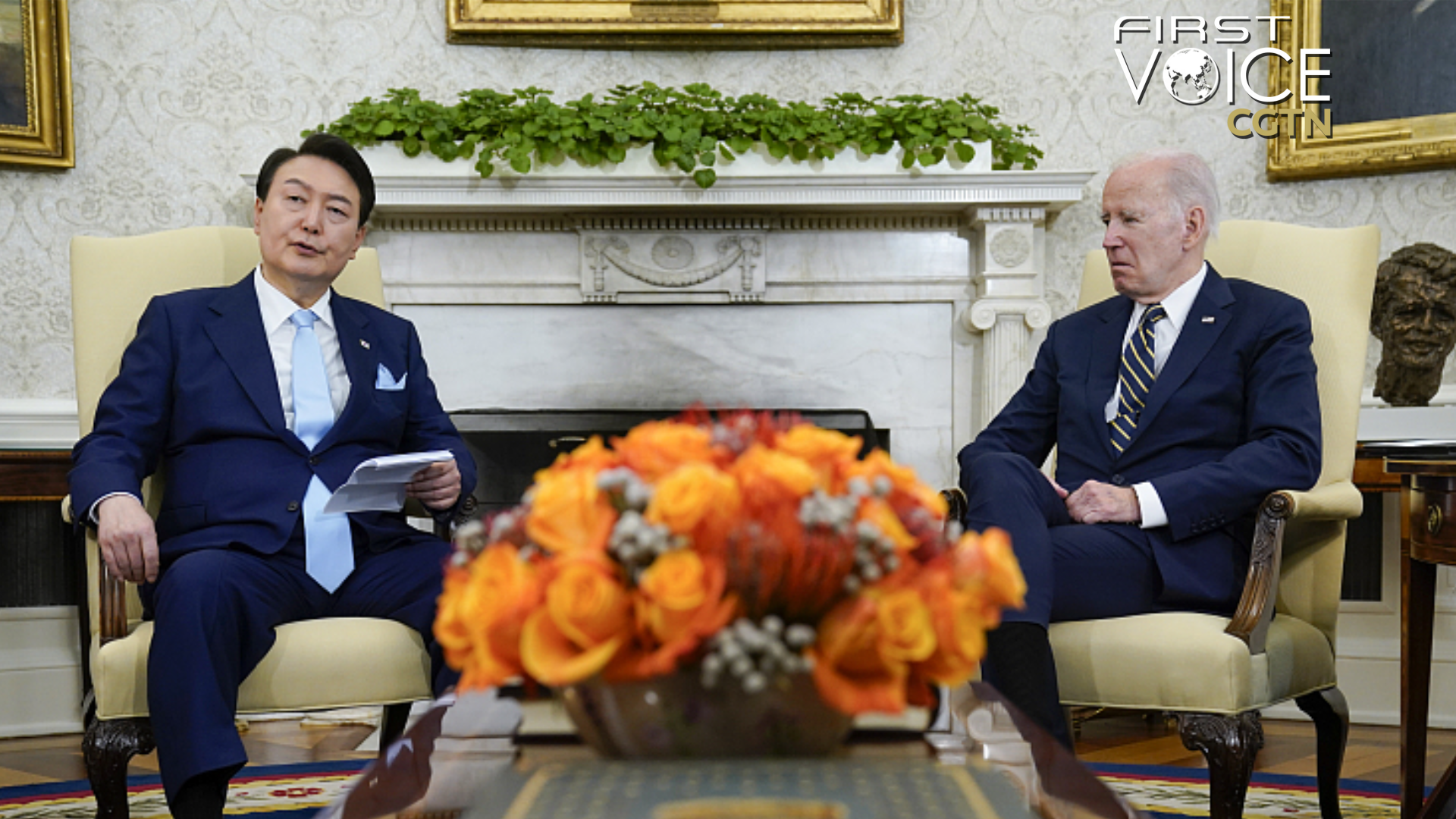
Editor's note: CGTN's First Voice provides instant commentary on breaking stories. The column clarifies emerging issues and better defines the news agenda, offering a Chinese perspective on the latest global events.
By Gabriela Bernal
South Korean President Yoon Suk-yeol is on a high after holding a summit with U.S. President Joe Biden and announcing plans to further deepen the alliance. Still, not all South Koreans are sharing his excitement about the summit results, especially with the South Korean president's increasingly all-in approach with Washington.
Public opinion was already unfavorable toward Yoon's foreign policy in the days and weeks leading up to the summit due mainly to the controversial forced labor deal with Japan and allegations that the U.S. had spied on South Korean government officials. Protests were held on April 24 in front of the presidential office to oppose Yoon's U.S. trip while other activists held a rally the next day in front of the U.S. Embassy in Seoul to denounce the U.S. for spying on its so-called close ally.
Many in South Korea see Yoon's diplomatic strategy as one that is overly aligned with U.S. goals and that places more importance on ties with Washington and Tokyo than on South Korea's own long-term national interests. This became crystal clear in the wake of the March summit between President Yoon and Japanese Prime Minister Fumio Kishida. The "agreement" to "resolve" the forced labor issue resulted in heavy public backlash and in opposition politicians labeling Yoon's foreign policy for Japan "humiliation diplomacy." On top of that, Yoon faced heavy criticism for not demanding any apologies or explanations from the U.S. after allegations surfaced of Washington having possibly wiretapped the South Korean presidential office.
Ignoring the tense domestic mood, Yoon prioritized the summit with U.S. President Joe Biden. At their summit, the two leaders agreed to strengthen extended deterrence to deal with threats coming from the DPRK and to form a Nuclear Consultative Group, which Yoon argued would be more effective than NATO's Nuclear Planning Group.
Although Yoon saw the summit as a major win, reactions in South Korea have so far been mixed. One leading newspaper blamed Yoon for blindly adopting the "America First" agenda at the expense of South Korean companies. Similarly, former Minister of Unification Lee Jong-seok stated that "South Korea stands to suffer definite losses in economic and security-related terms" as a result of the summit.
In fact, many business leaders that had traveled with Yoon to Washington extended their stays in the U.S. or remained abroad after the summit to try and make gains independently, given the president's failure to do so at the summit with Biden.
Backlash from the opposition was especially strong, with Democratic Party leader Lee Jae-myung accusing the Yoon administration of "failing to protect the national interest."Similarly, Justice Party leader Lee Jeong-mi said "the people had to feel humiliation at a president who has thrown away the dignity of a sovereign country."
It's worth noting that opposition to the summit results also emerged from within Yoon's own conservative circles, with many lamenting Yoon's comments on non-proliferation. Various conservative newspapers highlighted the issue in detail, expressing disappointment at what they see as a major concession to the U.S.
Even Christian pastors together with professors and academics from over 20 universities have released statements condemning the Yoon government's foreign and domestic policies.
It is clear that opposition to Yoon's diplomatic strategy is pervasive and that many are concerned about the direction he is leading the country in. Such concerns are valid, as South Korea stands to gain nothing from adopting an unbalanced diplomatic approach relying completely on the U.S. Although the U.S. will always do what is in its best interest regardless of the concerns of its allies, South Korea does not seem to be putting its own interests first.
During his trip, Yoon spoke a lot about freedom but it is unclear why he is putting all of South Korea's eggs in America's basket without thinking of his own country's long-term national interests. This does not seem like a policy centered around freedom or independence.
South Korea's complex geopolitical position means it cannot afford to isolate itself by going all-in with just one country. It is not only related to economic factors but is relevant when it comes to the security situation with the DPRK as well. Countries like China and Russia are crucial in order for diplomacy and dialogue with the DPRK to advance in the right direction. However, if Seoul continues to adhere to Washington's hardline stance focused mainly on military measures, diplomacy with Pyongyang will become increasingly difficult and the chances of conflict breaking out on the peninsula will continue to rise.
Concerns are now high about the upcoming visit of Kishida to Seoul later this week. It would be wise for the Yoon government to keep South Korea's long-term interests in mind and not conduct any hasty diplomacy that could result in further humiliation and public disappointment.
This First Voice article is written by CGTN Special Commentator Gabriela Bernal, a Korean affairs analyst and a Ph.D. student at the University of North Korean Studies in Seoul, South Korea.

 中文
中文



